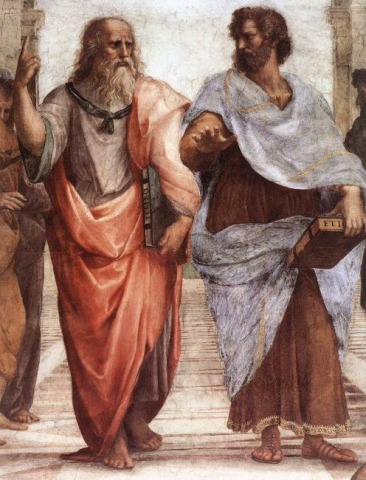
Maybe we make up right and wrong. Maybe human nature doesn't have any inbuilt meaning; maybe the way of life I choose has moral meaning just because I choose it.
If you say that, aren't you supposing that one part of human nature does have meaning apart from your choosing -- aren't you ascribing meaning to the will, the choosing power, itself?
Why do you say that?
Because if it didn't have meaning, then how could it give it? You can't get something from nothing; you can't get meaning from the meaningless. When you say that human nature has no inbuilt meaning so that only your choices matter, what you're really saying us that exactly one part of human nature does have inbuilt meaning: The part that makes your choices.
What difference does that make?
It's a bit arbitrary, isn't it? If the will has inbuilt meaning, why shouldn't the other parts of human nature have inbuilt meaning too? Why should every part be meaningless except that one?
So what if they do have moral meaning? That doesn't stop the will from having moral meaning.
Of course not. But it stops it from having the meaning that you want it to. It isn't free to confer meanings on things that have inbuilt meanings already.
In that case, maybe nothing has moral meaning.
If you really believed that were true, then you wouldn't bother to argue with me.
Then maybe we create moral meaning.
Even supposing that human beings can create, surely a morality is not the kind of thing we can create. The whole meaning of morality is a norm which obligates us whether we like it or not. If we create it, then we can change it to suit ourselves. But if we can change it to suit ourselves, then it is not morality.
But we create other things. Why not this one?
I think I've just told you why not! But in fact we cannot genuinely create anything; we are inventive, but our inventiveness is not of that kind.
Why isn't it?
Because to create is to bring something forth from nothing. We humans can bring forth only from materials that are already available. We can bend the givens of human nature this way or that, but we cannot give ourselves new givens. Even if we could give ourselves new givens, the choice of which givens to give ourselves would be conditioned by what had been given before. To put this another way, if you ask a human being "What would you wish to become, if you could become anything you wished?", then his answer will be conditioned by the fact that he is now a human being. He may ask to have nonhuman attributes -- like the ability to fly -- but he will never ask to have attributes that a human being finds unattractive. I suppose you know the story about Friedrich Nietzsche and the dust of the earth.
And the dust of the earth? No. Tell it to me.
Nietzsche says to God, "I too can create a man." God says to Nietzsche, "Try." Nietzsche takes a fistful of dust and begins to mold it. God says, "Disqualified. Get your own dust."
I don't see the point.
It's just what I was saying. We can't really create. That's why, as C.S. Lewis explained, the so-called new moralities are never new. All they ever do is distort something they have borrowed from the old morality.
What do you mean by the "old" morality? Conventional mores?
Not exactly. The natural law.
Give me an example of a new one.
We've already had one -- your new morality of will. A person's choices certainly deserve some respect. But you blew this up into the principle that a person's choices deserve absolute respect. In its name you denied every other moral consideration whatsoever.
I'm still not convinced that I was wrong. Give me another example.
Certainly. The old morality commands compassion and prohibits murder. The new morality of euthanasia justifies murder in the name of "compassion" -- a bogus compassion which doesn't care how the painful sight is made to go away. Just as in the other case, a single precept is first distorted, then wielded against the rest of moral law.
So you think these new moralities fob off picking and choosing as creating.
Exactly. They don't make something from nothing; they choose and pervert an element of what is already there.
But human beings do create morality. What else do you think culture is?
Culture doesn't create new frameworks of moral possibility. It discovers, elaborates, and makes choices among possibilities within a framework already given. Or -- if it goes bad -- then it fights that framework, but even then it doesn’t create a new one.
A Dialogue on Natural Law, Part 7